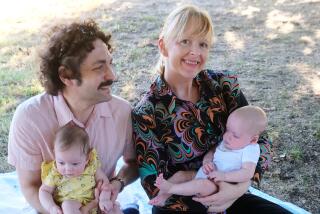John Lloyd; Studied Greek, Roman Times
- Share via
John Lloyd, 51, British archeologist who studied ordinary people in classical Greek and Roman times. A graduate of Manchester University, Lloyd was 24 when he was named field director of the archeological site of Berenice, an ancient Greek and Roman city that is now part of the Libyan port of Benghazi. During the next three years, Lloyd’s team completed a major excavation and compiled extensive data about life in Berenice during the three centuries before Christ. Later, Lloyd worked in the Biferno valley east of Rome, the ancient home of Samnite warriors who resisted Rome’s expansion. He discovered a busy countryside of farms, homes and communities. Lloyd taught at Sheffield University from 1977 to 1988 and then moved to Oxford, where he was a fellow of Wolfson College. On May 31 in London of a brain tumor.
Charles Palmer; Led U.S. Forces in Europe
Charles Palmer, 97, four-star general who was head of American forces in Europe in the early 1960s. The highly decorated veteran served in six major campaigns during World War II. He was a major in the British West Indies and fought in the Japanese attack on Pearl Harbor. He served as chief of staff for the Army’s 2nd Armored Division, participating in the Normandy invasion. Palmer later was named chief of staff for the 6th Army Group and saw action in France and Germany. During the Korean War, he was commander of the 1st Cavalry Division. In 1959, he replaced Gen. W.B. Palmer, his brother, as general in charge of U.S. forces of Europe. Palmer’s honors included the Silver Star, the Legion of Merit and the Distinguished Flying Cross. On June 7 in Washington.
Carmen Perry; Translated Alamo Story
Carmen Perry, 93, who translated a controversial account of the purported capture and execution of Davy Crockett. Perry was born in Torreon, Mexico, to a Spanish mother and German father and, along with her two brothers, learned German, English, Spanish and Catalan, a dialect of French and Spanish spoken in Spain. The family fled to San Antonio at the outbreak of the Mexican Revolution and Perry studied Spanish literature at the University of Texas. She became a leading translator and researcher from 1959 to 1968 at the Daughters of the Republic of Texas Library at the Alamo. That work led to her controversial translation, published in 1975, of “With Santa Anna in Texas: Diary of Jose Enrique de la Pena.” The diary by De la Pena, a lieutenant colonel under Mexican Gen. Antonio Lopez de Santa Anna, described how Crockett and six other Alamo defenders were captured alive after the March 1836 battle and, on Santa Anna’s orders, were stabbed with bayonets and shot. Traditional accounts say that all Alamo volunteers fought until death, including Crockett. The legendary hero, according to most accounts, ran out of ammunition but used his long rifle as a club until he fell dead near the front doors of the Alamo’s chapel. After her work was published, Perry received threatening phone calls and letters for defiling Crockett’s memory. On Friday in San Antonio.
More to Read
Sign up for Essential California
The most important California stories and recommendations in your inbox every morning.
You may occasionally receive promotional content from the Los Angeles Times.











